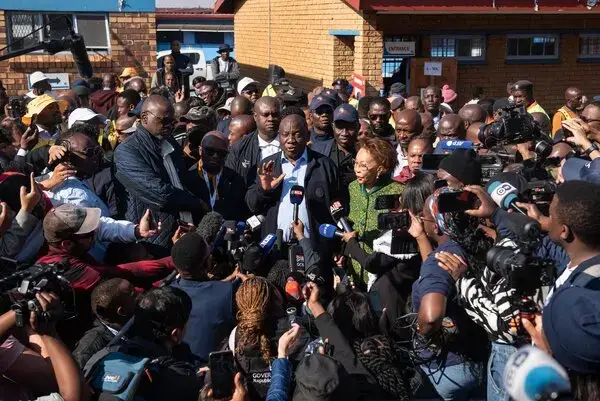|
LISTEN TO THIS THE AFRICANA VOICE ARTICLE NOW
Getting your Trinity Audio player ready...
|
The initial results from South Africa’s most closely fought elections since the African National Congress (ANC) came to power 30 years ago were announced Thursday. With approximately 19% of voting districts counted, the ANC was leading with 43%, followed by the Democratic Alliance (DA) at 25%.
The Economic Freedom Fighters (EFF) had garnered about 9%, while the uMkhonto weSizwe (MK) Party of former President Jacob Zuma is at around 8%. Final results are expected over the weekend.
Early indications suggest that the ANC might lose its parliamentary majority for the first time since Nelson Mandela led the party to victory in 1994, ending the apartheid era. News24 projects that the ANC’s final vote share could be around 42%, down from the 57% it secured in the 2019 elections.
The ANC is suffering significant losses to the MK Party, especially in KwaZulu-Natal, the home province of Jacob Zuma and the region with the second-highest number of votes. Zuma’s surprise announcement in December that he was leaving the ANC to support MK has notably impacted the ANC’s performance. Despite being barred from running for parliament due to a contempt of court conviction, Zuma’s name appeared on the ballot as MK leader.
Wednesday’s election saw long queues at polling stations across the country, with voters addressing key issues such as widespread government corruption, high unemployment, and rampant crime. An electoral official in Johannesburg noted that the queues were reminiscent of the historic 1994 election when black South Africans could vote for the first time.
Sifiso Buthelezi, voting in Johannesburg’s Joubert Park, the largest polling station in South Africa, expressed the sentiment of many: “Freedom is great but we need to tackle corruption.”
Change is a recurring theme, particularly among young voters. Ayanda Hlekwane, part of South Africa’s “born-free” generation born after 1994, is optimistic despite his struggles to find employment despite holding three degrees. “I’m working on my PhD proposal so that I go back to study in case I don’t get a job,” he told the BBC in Durban.
A record 70 parties and 11 independents contested in these elections, with South Africans voting for a new parliament and nine provincial legislatures. Analysts suggest this indicates widespread disillusionment with the ANC. “We are entering the next phase of our democracy, and it is going to be a big transition,” political analyst Richard Calland told the press. “We will either become a more competitive and mature democracy, or our politics will become more fractured.”
The main opposition, the DA, has formed a pact with 10 other parties to create a coalition government if they secure enough votes to oust the ANC. However, this remains unlikely, with the ANC expected to remain the largest party, positioning it to lead a coalition if its support drops below 50%.
South Africans do not directly vote for a president; instead, they elect members of parliament who then select the president. Thus, current President Cyril Ramaphosa is likely to remain in power.
Over 27 million people were registered to vote, with a significant proportion of young voters, who could play a decisive role. Artist Njabulo Hlophe, 28, highlighted the importance of youth participation: “This is as much our country as our parents’… they’re leaving it to us, so someone that really cares about the young people is someone I’m really looking at.”
Support for the ANC is expected to be higher among the older generation. One 89-year-old woman, Elayne Dykman, expressed her hope that young South Africans do not take their right to vote for granted.











LEAVE A COMMENT
You must be logged in to post a comment.